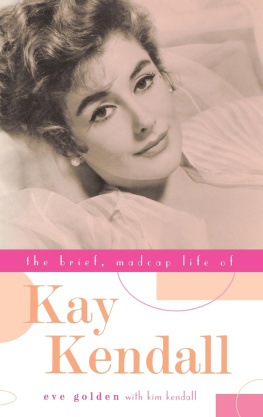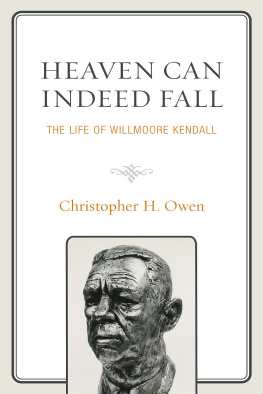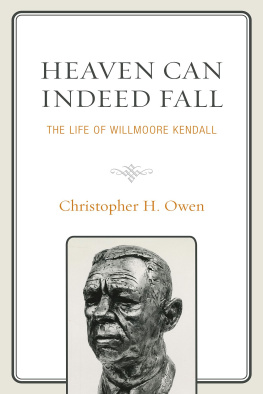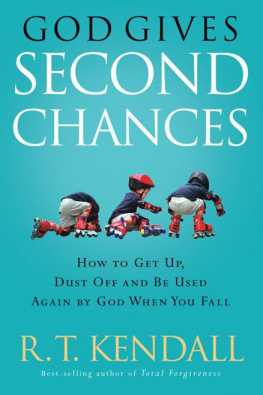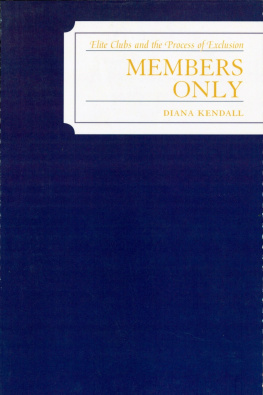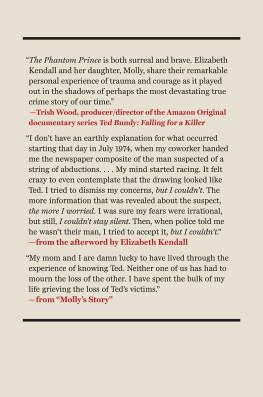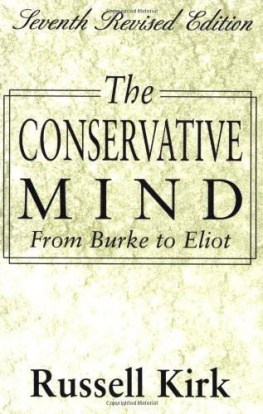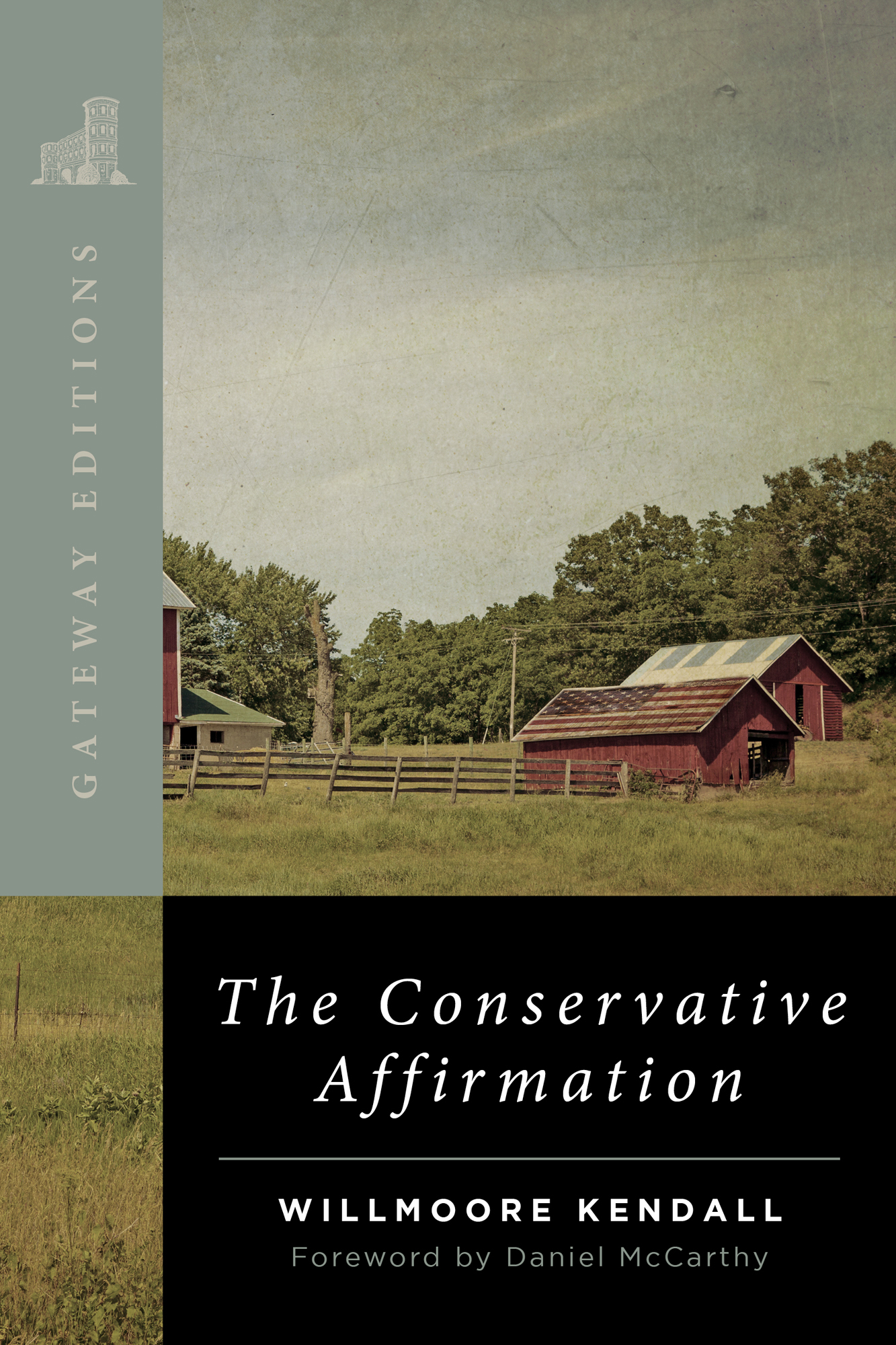Contents
Guide
Gateway Editions
The Conservative Affirmation
Willmoore Kendall
Foreword by Daniel McCarthy
To Nellie
who invented it
and Yvona
who barreled it through
F OREWORD The Philosopher of Right-Wing Populism
W illmoore Kendall is the most important conservative philosopher of the twenty-first century, even though he died in 1967. His genius was recognized in his lifetime, but it was often overshadowed by his tempestuous personal life. In the decades since his death, however, the significance of his achievement has become undeniable. Willmoore Kendall is the philosopher of right-wing populismand the populist right has proved to be the keystone of American conservatism.
Populism is a dirty word to many Americans, and not just on the political left. Kendall himself preferred to present his work in terms of democracy, a word that for many conservatives is almost as alarming as populism. But whatever the language one chooses, the substance of Kendalls thought is clear. He trusts the American people over the educated elites, and he finds the liberal ideology of the educated classes to be both false and harmful to our country. He speaks for the populist position. Bookish conservatives who blanch at that should stop to consider that every nasty stereotype of populism is also a stereotype that liberals have applied to conservatives.
For as long as conservatism has been an organized political force, its opponents have accused it of being anti-intellectual, vulgar, and demagogic. In the nineteenth century John Stuart Mill famously called conservatives the stupid partyor rather the stupidest party. By the middle of the twentieth century American liberals had also begun to brand conservatives as unpatriotic. Conservatism, they argued, was a European ideology identical with absolutism, theocracy, and serfdom, and its modern heirs were racism and fascism.
If there was such a thing as American conservatism at all, it could only mean conserving an older form of liberalism. There was nothing else to conserve. The American tradition was exclusively liberal. When conservatives failed to accept this, they only demonstrated their ignorance and un-American character. If they turned toward populism, they would soon become fascists.
Conservatives are not stupid, of course, and populism is not fascism. But because populism is anti-elitist, it does not always have articulate theorists on its side. Conservatism, meanwhile, counts many policy thinkers, historians, journalists, legal minds, and literary men among its adherents, but only a few political philosophers. George Santayana was a philosopher who can justly be called a conservative, but he was not overtly a philosopher of conservatism. Michael Oakeshott and Roger Scruton did make conservatism a subject of their philosophical investigations, and their ideas do apply in the American context. But they require a certain amount of translation, and neither of those great British conservative thinkers of the twentieth century wrote extensively about the political order on this side of the Atlantic.
Without a clear philosophical guide, conservatives are easily misled about their own tradition, and liberals are ready to take advantage of conservative confusion to disarm and discredit the right. When conservatives are unable to defend their place in the American tradition, liberals easily make them look like fools, hypocrites, oddballs, or traitors. To avoid this, American conservatives need a better, more philosophically grounded understanding of themselves as both Americans and conservatives. They need The Conservative Affirmation.
In this book, first published in 1963, Willmoore Kendall provides what remains the best conservative interpretation of American democracy and the best philosophical account of right-wing populism. In the six decades since The Conservative Affirmation first appeared, the struggle between left and right in American politics has proceeded along the battle lines Kendall identified in these pages. Indeed, the battle has intensified along the very points Kendall recognized as most decisive. Already in the 1960s, Willmoore Kendall gave conservatives the theoretical support for populism that they need today.
The ideas in this book are timeless. Readers are forewarned, however, that Kendalls occasions for expressing those ideas are often topical to the time when he wrote. Kendall is a brilliant writer but an idiosyncratic one. He combines philosophical acuity with a seemingly casual and at times colloquial prose style. Both make demands of the reader. Add the historical references that may seem obscure today, and the riches of The Conservative Affirmation can appear rather inaccessible. There is a mountain to be climbed, at the top of which is an incomparable vista. But where does one start? Kendalls life provides one doorway to his thought. The context of the postwar conservative movement that he helped to launch provides another.
Willmoore Kendalls early life was extraordinary. His father, Willmoore Kendall Sr., was a blind Methodist minister whose sermons against the Ku Klux Klan and U.S. intervention in World War I would make him a figure of controversy in the Oklahoma towns where he served. Between the battles he fought (and usually lost), his disability, and financial stress, Willmoore Sr. never rose as high in the world as he might have hoped, so he transferred his ambitions onto his son. Young Willmoore, born in 1909, was a child prodigy whose talents were honed by reading to his sightless father. He graduated from high school at thirteen and enrolled at Northwestern University.
That proved to be a disaster. He was academically unprepared: in fact, as related in Christopher Owens biography of Kendall, Heaven Can Indeed Fall, Willmoore Sr. had written all his [sons] high school papers. The boy was as socially isolated as one would expect a thirteen-year-old freshman far from home to be. He soon withdrew from Northwestern and enrolled at the University of Tulsa. By the time he was fifteen, he had transferred to the University of Oklahoma. He returned to Northwestern in 1926, earning his B.A. the following year and an M.A. the year after that, both in Romance languages, with a particular expertise in Spanish.
Oklahoma had been a rough and uninhibited place to grow up, and Willmoore Sr. was a theological modernist to the extent he retained his faith at all. Young Willmoore had a worldly upbringing, including a brush or two with the law. The Kendall family had political ties to the Democratic Party, and the ingenious boy saw for himself, as well as through his fathers experiences, the complexities of racial politics and domestic attitudes towards Americas burgeoning power beyond its border. Kendall worked as a cub journalist and wrote his first small book, Baseball: How to Play It and How to Watch It, in 1927.
While pursuing a Ph.D. at the University of Illinois, Kendall applied for a Rhodes Scholarship to Oxford University. His time there, where he studied with R. G. Collingwood, would be intellectually transformative. From Collingwood he acquired the habit of reading a text by asking what question the author was trying to answer. In his time away from the United States Kendall also lived in Spain, where he worked for United Press International (UPI) on the eve of the Spanish Civil War. Kendall considered himself a socialist in those days, and although he was not in Spain during the Civil War, it would have an effect on him not unlike the one it had on George Orwell, who was there to report on it in person. Back in America, Kendall would learn that old friends from the Spanish non-Communist left faced as much danger from their Stalinist allies as they did from their Nationalist enemies.


